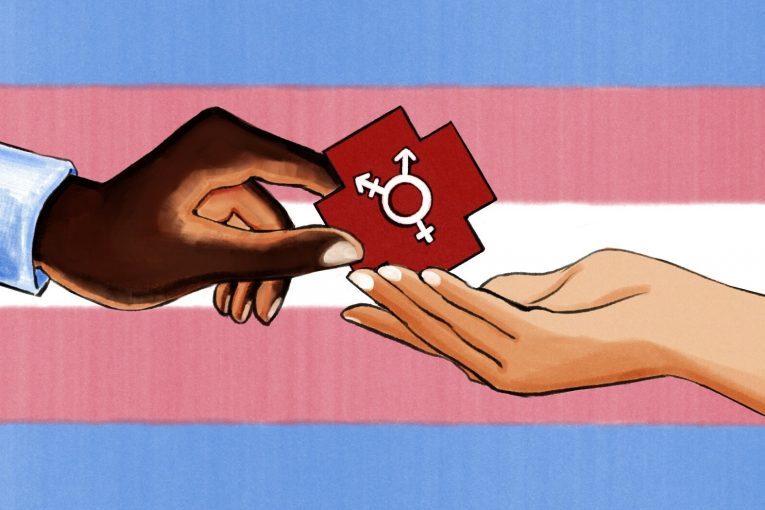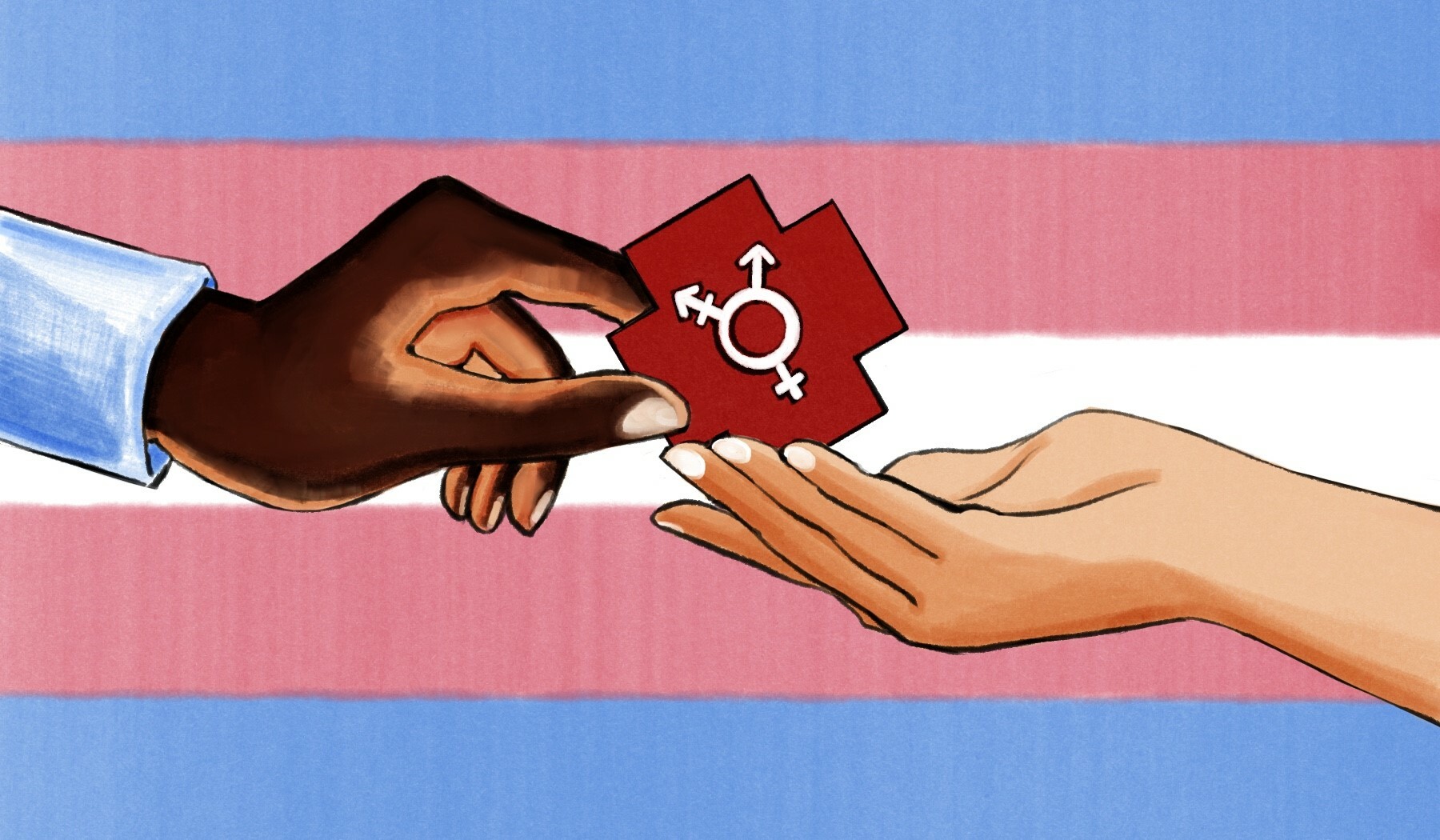

Transgender people who have experienced prison call for more humane conditions and treatment.
Nearly one in six transgender people report experiencing jail or prison at some point during their lives. For Black transgender people, the rate is nearly one in two. Once incarcerated, transgender people often experience assault and face isolation or solitary confinement. Too often, their voices go unheard.
This essay was originally published by the Vera Institute of Justice. The Vera Institute of Justice interviewed five transgender people who survived incarceration and asked them to share their stories. We have broken this out into five parts.
Part One – Ky (he/him/his)
From the very beginning, when I entered the prison, I was harassed by staff because of the way I looked. The male staff would follow us around and call us names. One officer told me I deserved to be raped, so that I would know I was a woman.
When I told the warden I am transgender and needed certain things to be added to the commissary, she told me, “There is no such thing as a trans man.” I was incarcerated in the Bible Belt and the warden said she had heard of trans women, but not trans men. She said she didn’t have information, even though my friends and family were sending  information and gender dysphoria is in the Diagnostic and Statistical Manual of Mental Disorders, Fifth Edition [DSM-5]. But the staff didn’t want to believe anything other than what they knew, or thought they knew.
information and gender dysphoria is in the Diagnostic and Statistical Manual of Mental Disorders, Fifth Edition [DSM-5]. But the staff didn’t want to believe anything other than what they knew, or thought they knew.
It took a year for me to get hormones, and I had to argue with the staff to get bloodwork to make sure my dosage was correct. If your dosage is too high, the testosterone can change your red blood cell count and cause clotting. You can have a heart attack. They didn’t even want to do the blood work.
The nurse who gave me my hormones just literally stabbed me with the needle. She would say she didn’t believe I needed the hormones and that I would be better off without them. She didn’t know how I felt or really anything about me. I had to write a grievance about her because she would literally stab me with the needle.
There were times when the medicine wasn’t correct, and I would bleed. They refused to give me any sanitary items or take me to the doctor. They said, “Oh, you think you are a man, you don’t need that.” Some people would share their sanitary products with me; if not, I would use a shirt or sheets from the bed and fill it with toilet paper to try to protect myself.
They prescribed me four different psychiatric medicines for depression and anxiety that I didn’t want to take. If I refused to take them, I would be placed in lockdown, which is when you are locked in a room all day. If they have enough staff, they let you out to shower. For time outside, you are locked inside a fence inside a bigger fence. It was like a very small cage you would see in a dog pound. I would refuse to go to yard call because I didn’t want to be inside of that cage. They medicated me to the point where the medicine made me sleep a lot. Then I would get in trouble for sleeping because I wouldn’t be able to stay awake for the random inspections. I was pepper sprayed and attacked in my room because they came for [an] inspection and I had just come back from pill call and I couldn’t stand up and stay awake. When one of the male officers from the inspection team came in and saw me sitting down, he said that I thought I was a man and that I could do what I wanted to do. He was going to teach me a lesson.
At first, I would lash out when they would say things to me. Then I realized that they would do this just so they could bring charges on me to take me to lockdown in a solitary confinement cell. I would be in lockdown for a month at a time. For a year, I was in and out of lockdown. Sometimes they would turn the lights on and leave them on forever as a way to irritate people. Or they would just leave you in complete darkness. You could go a day, or two days, without them turning the lights on. You had no light except the little light coming in under your door.
When we were in lockdown, we would scream to each other through the vents, like, “Hey what are you doing over there?” We would try to slide notes across the floor to other cells, just to have some human contact. If the officers saw us slipping paper under the door, they would step on it and throw it away, or they would get it and read it in front of everybody. I had only two officers, that I remember, who refused to treat us [as] less than human, and they got fired. It really hurt when they got fired because it felt good to have somebody who treated you like a person.
It would be good if all the officers treated people with common decency and just respected people, but I don’t know if you can put that in a policy. It seems like they have all the policies they need; it’s just training the staff and having them put the policies into action. Most of the issues come from the staff not being knowledgeable. They need to follow actual policy, versus their personal belief about what should or should not happen.
It took me a long time to get used to being free. To know that the doors weren’t going to be locked as soon as I got inside. I would hear the sound of keys and instantly jump. I would wake up at inspection times and stand by my door. My mom was like, “What are you doing?” It was one of the best feelings ever when I realized that I didn’t have to stand for inspection anymore. I had done it for so long that it was my normal. I have only been home for three years. It took about two years to get that feeling out of my system.
Today, I run an organization called Freedom Overground that helps people with the reentry process and helps people who are incarcerated file a grievance. A lot of people get ignored because they don’t use the correct language or the correct form. We make calls to prisons to advocate for people. We try to help them as much as we can. When people get out and have a criminal record, most of the jobs they get are factory work. For transgender men, we give them a backpack with work clothes, steel toed boots, a wallet, a gift card, personal hygiene items, and a cell phone. For transgender women, it’s a similar bag, but with makeup. I had an idea when I was in prison that I was going to get out and help people someday. A lot of people who are incarcerated really don’t have the support they need. I figured, why not start something to help them get on their feet when they get home? For people who have friends and family who are incarcerated, try to be there to support them and be involved. Even if you can’t help financially, sending a card really means a lot in there.
